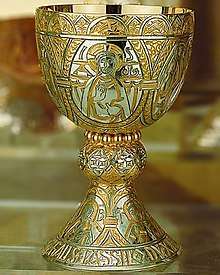Liutperga
Liutperga (Liutpirc) (8th century) was the daughter of Desiderius, King of the Lombards, and Ansa. She was the wife of Tassilo III, the last Agilolfing Duke of Bavaria.
She was married to Tassilo at some point prior to 770, possibly in 763, to confirm the traditional alliance between Lombardy and Bavaria. The couple had four sons: Theodo, Cotani, Hrodrud and Theodebert.[1][2]
When, in 788, her husband was deposed and tonsured along with her eldest son Theodo, Liutperga is unaccounted for. Again, in 794, when Tassilo was placed on trial before the Council of Frankfurt and his dynasty renounced, Liutperga is yet again not mentioned. It has been suggested this could be due to her death.[2]
Political agency
It has been argued that Liutperga resented the Frankish king Charlemagne.[1] This argument is based on both the supposed repudiation of his marriage to Liutperga's sister Desiderata and his subsequent destruction of the Kingdom of Lombardy and imprisonment of her parents.
Liutperga played an apparently major role in her husband's opposition to Charlemagne. Frankish annals references to Liutperga suggest this. The Annales Mettense Pirores refer to her as Tassilo's "wicked wife" and the Revised Royal Frankish Annals refer to the Liutperga's "urging" of her husband to push the Avars into conflict with Charlemagne.[2]
Liutperga is also referenced in a Fresising charter of 804. The charter notes that a 'Bishop Arbeo' had angered Tassilo and Liutperga because of his close relations with the Franks and they had therefore removed churches from his possession.[2]
Tassilo Chalice

The Tassilo chalice, a creation of someone with experience in insular craftmanship, somewhen between 770-788, was most likely a gift to the Kremsmünster monastery from Liutperga and Tassilo.[3] The inscriptions at the bottom of the cup read '+ Tassilo Dux fortis + Liutpirc virga regalis'. 'virga regalis' translates to 'the royal rod/branch'.[2]
References
- Airlie, Stuart (2009). Narratives of Triumph and Rituals of Submission: Charlemagne's Mastering of Bavaria. Cambridge: Cambridge University Press. p. 98.
- Nelson, Janet L. (Janet Laughland), 1942- (2007). Courts, elites, and gendered power in the early Middle Ages : Charlemagne and others. Aldershot, Hants, England: Ashgate. ISBN 9780754659334. OCLC 77004241.CS1 maint: multiple names: authors list (link)
- Ryan, Michael (1990). "The Formal Relationships of Insular Early Medieval Eucharistic Chalices". Proceedings of the Royal Irish Academy: Archaeology, Culture, History, Literature. 90: 281–356. JSTOR 25516070.
| Preceded by Hiltrud |
Duchess of Bavaria 770–788 |
Succeeded by Fastrada |